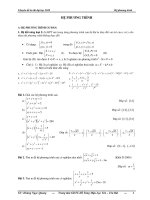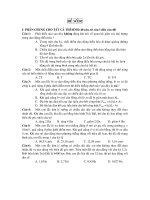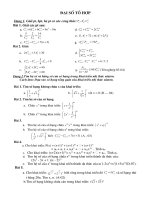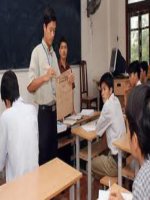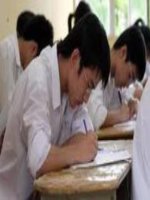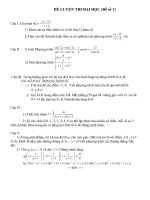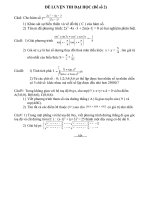Luyen Thi Dai Hoc 2010 3
Bạn đang xem bản rút gọn của tài liệu. Xem và tải ngay bản đầy đủ của tài liệu tại đây (305.82 KB, 6 trang )
<span class='text_page_counter'>(1)</span><div class='page_container' data-page=1>
<b> Luyện Thi Đại Học Khối D (3) ~ 1 </b>
<b>L</b>
<b>U</b>
<b>YỆ</b>
<b>N</b>
<b>T</b>
<b>H</b>
<b>I</b>
<b>Đ</b>
<b>Ạ</b>
<b>I</b> <b>HỌCN<sub>Ă</sub></b><b>M</b>
<b>2</b>
<b>01</b>
<b><sub>0</sub></b>
<b>(</b>
<b>3</b>
<b>)</b>
<i><b>Questions 1-5. Mark the letter A, B, C, or D to indicate the word that differs from the rest in the position of </b></i>
<i><b>the main stress in each of the following questions. </b></i>
1. A. domestic B. difficult C. dilemma D. dilution
2. A. nonsense B. nonplus C. nonesuch D. nonsuit
3. A. superficial B. supermarket C. supernormal D. superprofit
4. A. television B. supervision C. intervention D. realization
5. A. landscape B. escape C. homage D. courage
<i><b>Questions 6-35. Mark the letter A, B, C, or D to indicate the correct option to fill each blank. </b></i>
6. All the girls but one...present yesterday.
A. was B. were C. is D. are
7...it is getting dark, we will not wait for him any longer.
A. Unless B. Since C. While D. Although
8. The students sat quietly in the classroom,...to their teacher.
A. listening B. listen C. listened D. listens
9. Though she was very tired, she went on...
A. work B. to work C. working D. worked
10. Our class...of twenty boys and ten girls.
A. is consist B. is composed C. contains D. contained
11. He had the sofa delivered, ...
A. didn't he B. wasn't he C. couldn't he D. shouldn't he
12. I'll come...help you.
A. to B. in order C. for D. so
13. "Tell me when you're coming to London, before I set off." ~ “Certainly. I'll ……..you.”
A. strike B. sound C. ring D. hit
14. He can't stand...in such poor conditions.
A. to living B. living C. live D. to be alive
15. Nobody is ready to go, ...?
A. are they B. isn't he C. is he D. aren't they
16. Yesterday morning I got up anh looked out of the window. The sun was shining but the ground was very
wet. It...
A. has been raining B. rained C. had D. had been raining
17. Willie Cather, ... a prominent American writer, grew up in Nebraska during the early farming years.
A. became B. who became C. she became D. it is she who became
18. If I...wings, I... take an airplane to fly home.
A. have - won't have to B. had - wouldn't have to
C. had - didn't have to D. have - will have to
19. They have no...for help.
A. expectation B. expect C. expectative D. expectancy
20. A new style of jeans... B. were just introduced in the USA.
A. has just introduced
C. has just been introduced D. have just been introduced
21. There's a law that says you...throw trash on the street.
A. don't have to B. must not C. might not D. couldn't
22. Boys and girls may behave...in this situation.
A. difference B. differing C. different D. differently
23. They are trying to...the problem.
A. fail B. succeed C. gain D. solve
24. When he worked here, Simon...mistakes.
A. was always making B. made always C. was making always D. always made
25. At school, David was...anyone else in his class.
</div>
<span class='text_page_counter'>(2)</span><div class='page_container' data-page=2>
<b> Luyện Thi Đại Học Khối D (3) ~ 2 </b>
26. ...the people in our village buy meat every day.
A. Just a few B. Only some C. Not much of D. Not many of
27. Tom works at a garage and so spends...lying under motor cars.
A. many time B. many times C. much time D. a lot of times
28. Jack went out, but he didn't tell...where he was going.
A. anyone B. no one C. one D. none
29. "Do the Smiths live next door to you?" ~ "No, but they..."
A. used to B. used to do C. used to was D. used to did
30. Someone must have taken my bag. I clearly remember...it by the window and now it has gone.
A. to have left B. leave C. to leave D. leaving
31. He...me by asking me stupid questions while I am working.
A. annoys B. quarrels C. interferes D. damages
32. The job was more difficult than I...expected it to be.
A. have B. had C. would D. might
33. A good friend will stand...you when you're having problems.
A. by B. against C. out D. for
34. Everything included, the cost of our new living room came to a... total of £10,000.
A. grand B. great C. gross D. full
35. I don't hate classical music. On the..., I like it very much indeed.
A. opposite B. contrary C. alternative D. contrast
<i><b>Questions 36-45. Read the following passage and mark the letter A, B C, or D to indicate the best option for </b></i>
<i><b>each of the blanks. </b></i>
Why did you decide to read this, and will you keep reading to the end? Do you expect to understand every
single part of it and will you remember anything about it in a fortnight's (36)...? Common sense
(37)...that the answers to these questions depend on "readability" - whether the (38) ... matter is
interesting, the argument clear and the (39) ... attractive. But psychologists are trying to (40) ... why
people read - and often don't read certain things, for example technical information. They also have examine so
much the writing as the readers.
Even the most technically confident people often (41) ...instructions for the video or home computer in
favour of hands-on experience. And people frequently take little notice of consumer information, whether on
nutritional labels or in the small print of contracts. Psychologists researching reading (42)...to assume that
both beginners and competent readers read everything put in front of them from start to finish. There are
(43)... among them about the role of eyes, memory and brain during the process. Some people believe that
fluent readers take in very letter or word they see; others (44)...that readers rely on memory or context to
carry them from one phrase to another. But they have always assumed that the reading process is the same:
reading starts, comprehension (45)... then reading stops.
36. A. term B. period C. time D. gap
37. A. suggests B. transmits C. advises D. informs
38. A. subject B. topic C. content D. text
39. A. pattern B. formation C. layout D. assembly
40. A. ensure B. determine C. value D. rate
41. A. miss B. omit C. pass D. ignore
42. A. tend B. undertake C. lead D. consent
43. A. objections B. arguments C. contests D. separations
44. A. insist B. direct C. urge D. press
45. A. sets B. occurs C. issues D. establishes
<i><b>Questions 46-55. Read the following passage and mark the letter A, B, C, or D to indicate the best answer to </b></i>
<i><b>each of the following questions. </b></i>
</div>
<span class='text_page_counter'>(3)</span><div class='page_container' data-page=3>
<b> Luyện Thi Đại Học Khối D (3) ~ 3 </b>
The deepest sections of the core are composed of water that fell as snow 160,000 years ago. Scientists in
Grenoble, France, fractured portions of the core and measured the composition of ancient air released from
bubbles in the ice. Instruments were used to measure the ratio of certain isotopes in the frozen water to get an
idea of the prevailing atmospheric temperature at the time when that particular bit of water became locked in the
glacier
The result is a remarkable unbroken record of temperature and of atmospheric levels of carbon dioxide. Almost
every time the chill of an ice age descended on the planet, carbon dioxide levels dropped. When the global
temperature dropped 9°F (5°C), carbon dioxide levels dropped to 190 parts per million or so. Generally, as each
ice age ended and the Earth basked in a warm interglacial period, carbon dioxide levels were around 280 parts
per million. Through the 160,000 years of that ice record, the level of carbon dioxide in the atmosphere
fluctuated between 190 and 280 parts per million, but never rose much higher-until the Industrial Revolution
beginning in the eighteenth century and continuing today.
There is indirect evidence that the link between carbon dioxide levels and global temperature change goes back
much further than the glacial record. Carbon dioxide levels may have been much greater than the current
concentration during the Carboniferous period, 360 to 285 million years ago. The period was named foi a
profusion of plant life whose buried remains produced a large fraction of the coal deposits that are being brought
to the surface and burned today.
<i>46. Which of the following does the passage mainly discuss? </i>
A. Chemical causes of ice ages.
B. Techniques for studying ancient layers of ice in glaciers.
C. Evidence of a relationship between levels of carbon dioxide and global temperature.
D. Effects of plant life on carbon dioxide levels in the atmosphere.
<i><b>47. The word "accumulated" is closest in meaning to... </b></i>
A. spread out B. changed C. became denser D. built up
<i>48. According to the passage, the drilling of the glacier in eastern Antarctica was important because it... </i>
A. allowed scientists to experiment with new drilling techniques.
B. permitted the study of surface temperatures in an ice-covered regior of Earth.
C. provided insight about climate conditions in earlier periods.
D. confirmed earlier findings about how glaciers are formed.
<i><b>49. The phrase "tantamount" is closest in meaning to... </b></i>
A. complementary to B. practically the same as
C. especially well suited to D. unlikely to be confused with
<i>50. According to the passage, Grenoble, France, is the place where... </i>
A. instruments were developed for measuring certain chemical elements.
B. scientists first recorded atmospheric levels of carbon dioxide.
C. scientists studied the contents of an ice core from Antarctica.
D. scientists studied the contents of an ice core from France.
<i>51. According to the passage, scientists used isotopes from the water of the ice core to determine which of </i>
<i>following? </i>
A. The amount of air that had bubbled to the surface since the ice had formed.
B. The temperature of the atmosphere when the ice was formed.
C. The date at which water had become locked in the glacier.
D. The rate at which water had been frozen in the glacier.
<i><b>52. The word "remarkable" is closest in meaning to... </b></i>
A. genuine B. permanent C. extraordinary D. continuous
<i><b>53. The word "link" is closest in meaning to... </b></i>
A. tension B. connection C. attraction D. distance
<i>54. The passage implies that the warmest temperatures among the periods mentioned occurred... </i>
A. in the early eighteenth century B. 160,000 years ago
C. at the end of each ice age D. between 360 and 285 million years ago
<i>55. According to the passage, the Carboniferous period was characterized by ... </i>
A. a reduction in the number of coal deposits B. the burning of a large amount of coal
C. an abundance of plants D. an accelerated rate of glacier formation
</div>
<span class='text_page_counter'>(4)</span><div class='page_container' data-page=4>
<b> Luyện Thi Đại Học Khối D (3) ~ 4 </b>
Some animal behaviourists argue that certain animals can remember past events, anticipate future ones, make
plans and choices, and coordinate activities within a group. These scientists, however, are cautious about the
extent to which animals can be credited with conscious processing.
Explanations of animal behaviour that leave out any sort of consciousness at all and ascribe actions entirely to
instinct leave many questions unanswered. One example of such unexplained behaviour. Honeybees
communicate the sources of nectar to one another by doing a dance in a figure-eight pattern. The orientation of
the dance conveys the position of the food relative to the sun's position in the sky, and the speed of the dance
tells how far the food source is from the hive. Most researchers assume that the ability to perform and encode
the dance is innate and shows no special intelligence. But in one study, when experimenters kept changing the
site of the food source, each time moving the food 25 percent farther from the previous site, foraging honeybees
began to anticipate where the food source wou appear next. When the researchers arrived at the new location,
<i><b>they would find the bees circling the spot, waiting for their food. No one has yet explained how bee whose </b></i>
brains weigh four ten-thousandths of an ounce, could have inferred the location of the new site.
Other behaviours that may indicate some cognition include tool use. Many animals, like the otter who uses a
<i><b>stone to crack mussel shells, are capable using objects in the natural environment as rudimentary tools. One </b></i>
researcher has found that mother chimpanzees occasionally show their young how to use tools open hard nuts.
In one study, chimpanzees compared two pairs of food we containing chocolate chips. One pair might contain,
say, five chips and three chips, the other four chips and three chips. Allowed to choose which pair they wanted,
<i><b>the chimpanzees almost always chose the one with the higher total showing some sort of summing ability. Other </b></i>
chimpanzees have learned to use numerals to label quantities of items and do simple sums.
<i>56. What does the passage mainly discuss? </i>
A. The role of instinct in animal behaviour.
B. Observations that suggest consciousness in animal behaviour.
C. The use of food in studies of animal behaviour.
D. Differences between the behaviour of animals in their natural environments and in laboratory experiments.
<i>57. Which of the following is NOT discussed as an ability animals thought to have? </i>
A. Selecting among choices B. Anticipating events to come
C. Remembering past experiences D. Communicating emotions
<i>58. What is the purpose of the honeybee dance? </i>
A. To determine the quantity of food at a site. B. To communicate the location of food.
C. To increase the speed of travel to food sources. D. To identify the type of nectar that is available.
<i><b>59. The word "yet” is closest in meaning to... </b></i>
A. however B. since C. generally D. so far
<i>60. What did researchers discover in the study of honeybees discussed paragraph 2? </i>
A. Bees are able to travel at greater speeds than scientists thought.
B. The bees could travel 25% farther than scientists expected.
C. The bees were able to determine in advance where scientists would place their food.
D. Changing the location of food caused bees to decrease their dance activity.
<i>61. It can be inferred from the passage that brain size is assumed to... </i>
A. be an indicator of cognitive ability B. vary among individuals within a species
C. be related to food consumption D. correspond to levels of activity
<i>62. Why are otters and mussel shells included in the discussion in paragraph 3? </i>
A. To provide an example of tool use among animals.
B. To prove that certain species demonstrate greater ability in tool use than other species.
C. To provide an example of the use of weapons among animals.
D. To show that animals are very good at using objects in their habitat.
<i><b>63. The word "rudimentary" is closest in meaning to... </b></i>
A. superior B. original C. basic D. technical
<i><b>64. The phrase "the one" refers to the... </b></i>
A. study B. pair C. chimpanzee D. ability
<i>65. Scientists concluded from the experiment with chimpanzees and chocolate chips that chimpanzees... </i>
A. lack abilities that other primates have
B. prefer to work in pairs or groups
</div>
<span class='text_page_counter'>(5)</span><div class='page_container' data-page=5>
<b> Luyện Thi Đại Học Khối D (3) ~ 5 </b>
<i><b>Questions 66-70. Mark the letter A, B, C, or D to show the underlined part that needs correction. </b></i>
66. Many Civil War battles were fought in Virginia than in any other state.
67. From 1785 to 1990, the capital of the U.S is located in New York City.
68. Astronomers do not know how many galaxies there are; but it is thought that there is millions or perhaps
billions.
69. Nutritionists recommend that foods from each of the four basic groups be eaten on a regularly daily basis.
70. More than 80 percent of labors at the construction site are temporary workers.
<i><b>Questions 71-75. Mark the letter A, B, C, or D to indicate the sentence that has the same meaning as the </b></i>
<i><b>original one. </b></i>
<i>71. Tâm Vy insisted on being told the complete story. </i>
A. Nothing but the whole story satisfied Tâm Vy.
B. Tâm Vy insisted on the complete story being told.
C. Tâm Vy demanded on being told the complete story.
D. The complete story was insisted on being told.
<i>72. The only thing that makes this job worthwhile is the money. </i>
A. Money is something that makes this job worthwhile.
B. Were it not for the money, this job wouldn't be worthwhile.
C. If it weren't been for the money, this job wouldn't be worthwhile.
D. Had it not been for the money, this job wouldn't have been worthwhile.
<i>73. Thoa's husband will be returning from the USA quite soon. </i>
A. Thoa and her husband will be returning from the USA quite soon.
B. It is Thoa's husband that is returning from the USA quite soon.
C. It won't be long before Thoa's husband returns from the USA.
D. It won't be long before Thoa's husband returns from the USA quite soon.
<i>74. I have called this meeting in order to present the latest sale figures. </i>
A. This meeting is called in order to present the latest sale figures.
B. My purpose in having called this meeting is to present the latest sale figures.
C. This meeting is in order to present the latest sale figures.
D. My purpose in this meeting is in order to present the latest sale figures.
<i>75. She has always had a good relationship with the children. </i>
A. She has got a lot of friend children. B. The children have had her as their friend.
C. She has always got away well with the children. D. She has always got on well with the children.
<i><b>Questions 76-80. Mark the letter A, B, C, or D to indicate the best sentence built from the given words or </b></i>
<i><b>phrases. </b></i>
<i>76. when 1/ airport/ plane/ already/ leave. </i>
A. When I arrived the airport, the plane had already left.
B. When I got to the airport, the plane had already left.
C. When I reached at the airport, the plane already left.
D. When I came the airport, the plane had already left.
<i>77. If/ weather/ fine/ an excursion/ tomorrow. </i>
A. If the weather will be fine, we will go on an excursion tomorrow.
B. If the weather is fine, we will go on an excursion tomorrow.
C. If the weather is fine, we would go on an excursion tomorrow.
D. If the weather were fine, we would go on an excursion tomorrow.
<i>78. She/ not alone/ when/ shopping/ yesterday. </i>
A. She was not alone when she did shopping yesterday.
B. She is not alone when she go shopping yesterday.
C. She was not alone when she went shopping yesterday.
D. She had not been alone when she went shopping yesterday.
<i>79. a pity/ wish/ tell/ about/ this. </i>
</div>
<span class='text_page_counter'>(6)</span><div class='page_container' data-page=6>
<b> Luyện Thi Đại Học Khối D (3) ~ 6 </b>
<i>80. Only/ this way/ make/ laws/ effective. </i>
A. Only by this way we can make our laws effective.
B. Only this way we can make our laws effective.
C. Only by this way can we make our laws effective.
D. Only by this way we can make it effective our laws.
<b>ANSWER KEY 3 </b>
<b>Câu </b> <b>Đ/Án Câu Đ/Án Câu Đ/Án Câu Đ/Án </b>
1 B 2 A 3 B 4 A
5 A 6 B 7 B 8 A
9 C 10 B 11 A 12 A
13 C 14 B 15 A 16 D
17 B 18 B 19 A 20 C
21 B 22 D 23 D 24 A
25 A 26 D 27 C 28 A
29 A 30 D 31 A 32 B
33 A 34 A 35 B 36 C
37 A 38 A 39 C 40 B
41 D 42 A 43 B 44 A
45 D 46 C 47 C 48 C
49 B 50 C 51 B 52 C
53 B 54 D 55 C 56 B
57 D 58 B 59 D 60 C
61 A 62 A 63 C 64 B
65 C 66 D 67 D 68 C
69 C 70 B 71 A 72 B
73 C 74 B 75 D 76 B
77 B 78 C 79 A 80 C
</div>
<!--links-->

